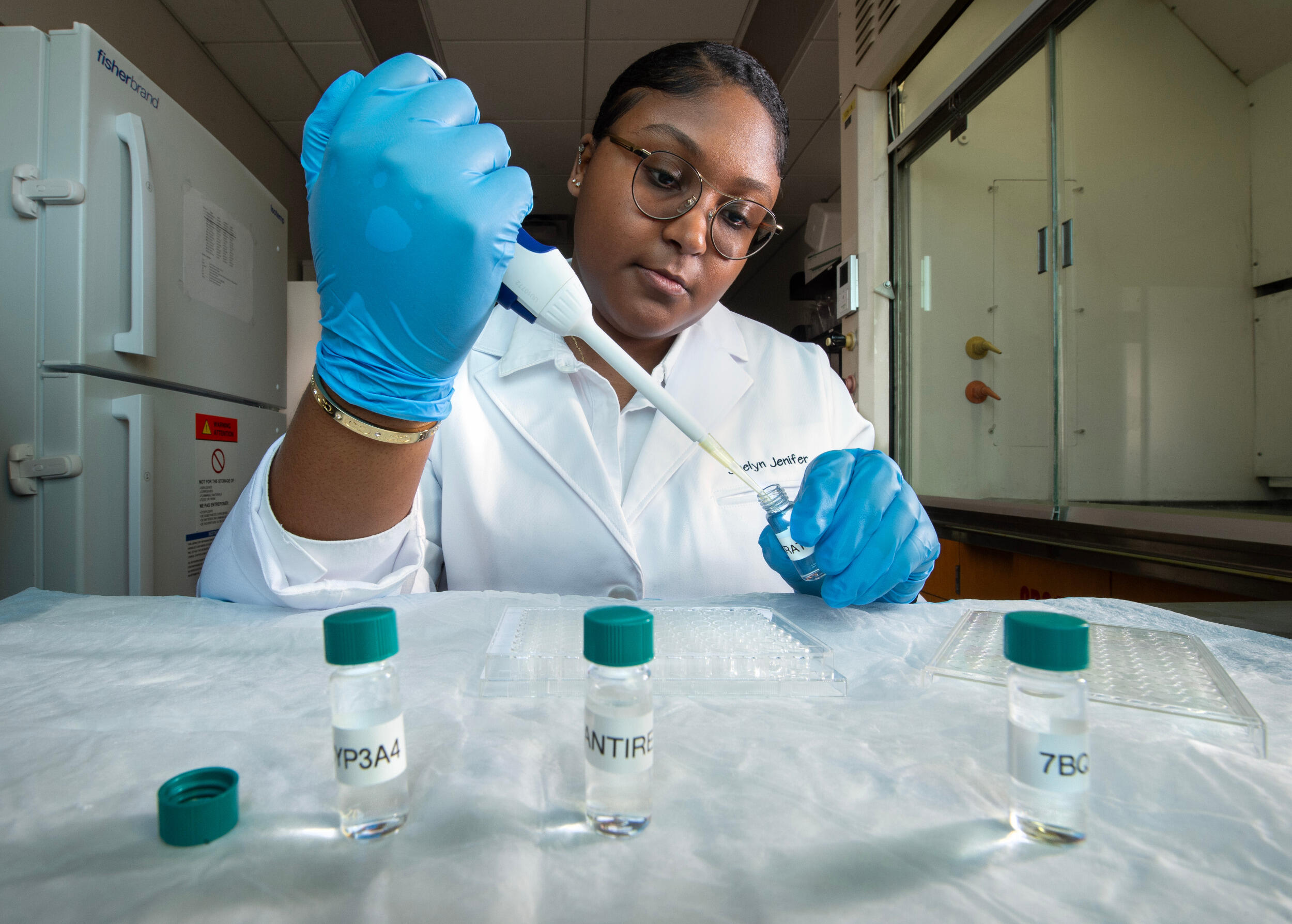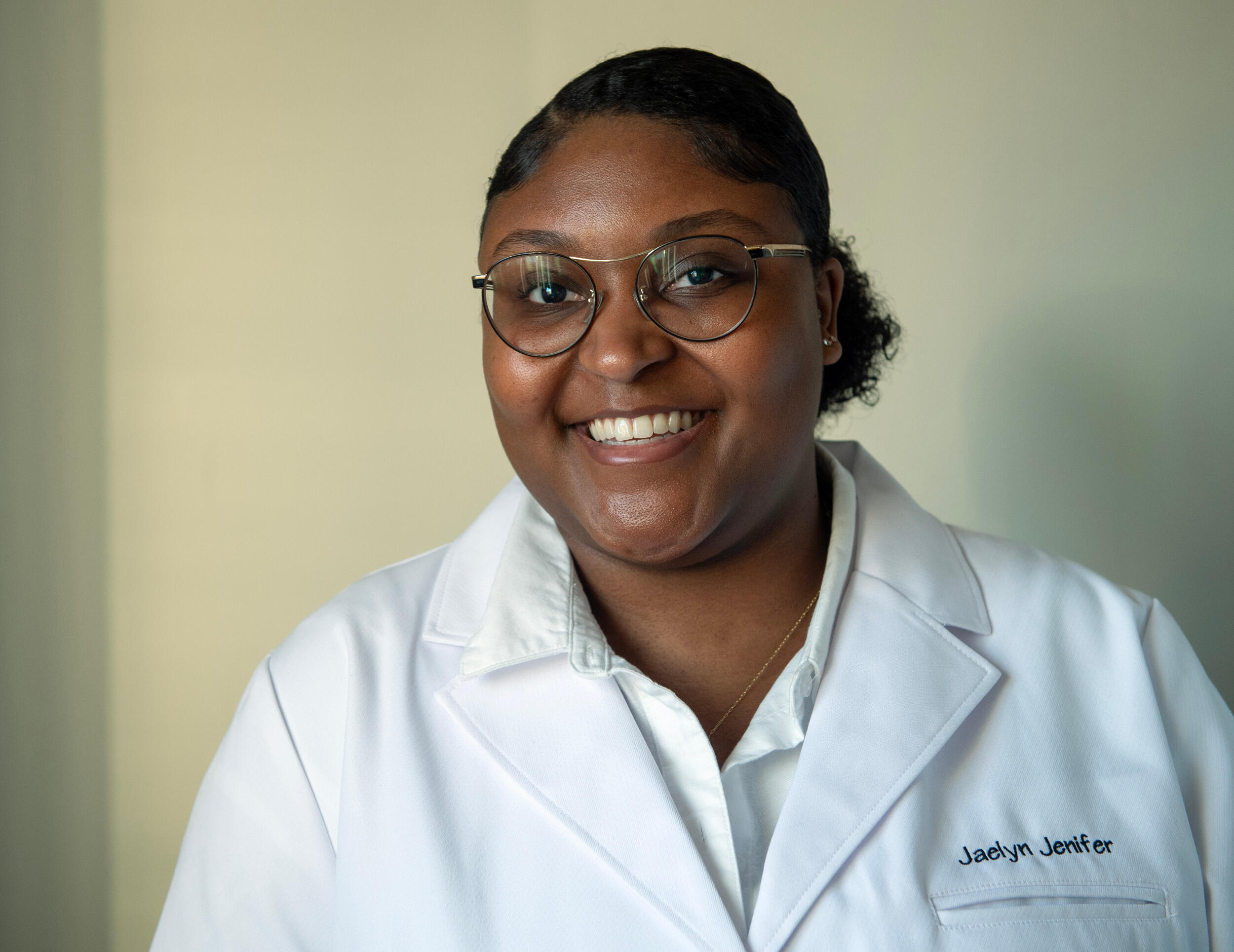
March 7, 2024
How I found my research: Jaelyn Jenifer hopes to be a ‘guardian of public health’
Share this story
How I found my research is an occasional series featuring VCU students sharing their journeys as researchers.
Jaelyn Jenifer did not expect to love conducting research. Initially, she just saw it as a way to bolster her academic credentials as a student at Virginia Commonwealth University. However, Jenifer has found that the rewards of undergraduate research go far beyond the curriculum vitae.
Jenifer, a senior majoring in chemistry and forensic science (with a concentration in forensic chemistry), is a native of Stafford, Virginia. She began her college career at Towson University in Maryland, but she elected to transfer to VCU to be closer to home during the COVID-19 pandemic. She also was drawn to VCU’s well-established Department of Forensic Science in the College of Humanities and Sciences.
Jenifer shared with VCU News how she found a field of study that fascinates her and why research brings invaluable lessons even when the process is challenging.
Tell us the focus of your research and why it is important/impactful for all of us.
Human Immunodeficiency Virus, better known as HIV, is a virus that attacks the cells meant to help our bodies fight infections. Opioid users are at a higher risk of HIV infection due to injection use. In addition, people diagnosed with HIV suffer an immense amount of pain, causing them to turn to opioids. With the limitation of the prescription of opioids, many of them switch to legal highs such as kratom, a plant product with opioid properties. My current research project evaluates the possible drug-drug interactions between kratom and antiretrovirals used for the treatment of HIV infections. The results of my research project will allow the clinical and forensic science community to further understand the risks and benefits associated with several chronically used copious drugs.
What inspired you to pursue this line of research?
When I transferred to VCU, I wanted to put myself in a position to be challenged. During a “Get To Know Your Faculty” event hosted by the forensic science department, I was made aware of the research efforts of Emanuele Alves, Ph.D., an assistant professor, regarding new psychoactive substances and homemade drugs. This field of study fascinated me and ultimately led to me becoming the youngest student at the time to be a part of Dr. Alves’ experimental research laboratory. While initially challenging, this experience has molded me into the confident forensic scientist I am today.
Tell us about a surprise in your research journey.
Initially, research was not very appealing to me. Admittedly, I reduced it down to something that would only bolster my resume. Everything changed once I found a project that I was actually passionate about and could easily be considered impactful from an outside point of view. Taking charge as well as having full credibility over the success of my project is what has kept me committed. During this time, I learned to listen to those who came before me and trust the process.
Tell us about an obstacle or challenge you had to overcome in your work.
Heading a research project can be a lengthy and tedious job. Experiments tend to yield unsatisfactory results more often than not. Right now, I am in the inhibitory phase to prove the inhibition of the CYP3A4 enzyme paired with other drugs. I have run numerous trials of this experiment, making small adaptations to the protocol with no success. To address this, I consult with the literature and my primary investigator on a regular basis. Research is unpredictable, but I never intend on giving up. There’s always something worth learning along the way.

Is there a memorable partnership or lesson you've embraced along the way?
Dr. Alves sets the standard of what a mentor should be: knowledgeable in their respective fields of study, ambitious towards their goals, and loyal to their mentee. Under her guidance, I have seen myself evolve into a full-fledged scientist who is more than capable of helping others as I now train incoming undergraduate and graduate students in my research lab.
What do you find fulfilling about the research process?
Forensic toxicologists are the guardians of public health. As an aspiring forensic toxicologist, I am grateful to be able to have the opportunity to work toward a greater cause, one that can provide knowledge and treatments to those suffering from chronic illnesses.
What advice would you offer undergrads to kick-start their own research journeys?
Not everything you learn will come from the classroom. Reach out to your professors, go to your department's networking events, and find other students who are interested in the same things you are. It’s the extra step that matters and will be remembered.
“How I found my research” is an occasional series featuring VCU student-researchers.
Subscribe to VCU News
Subscribe to VCU News at newsletter.vcu.edu and receive a selection of stories, videos, photos, news clips and event listings in your inbox.













